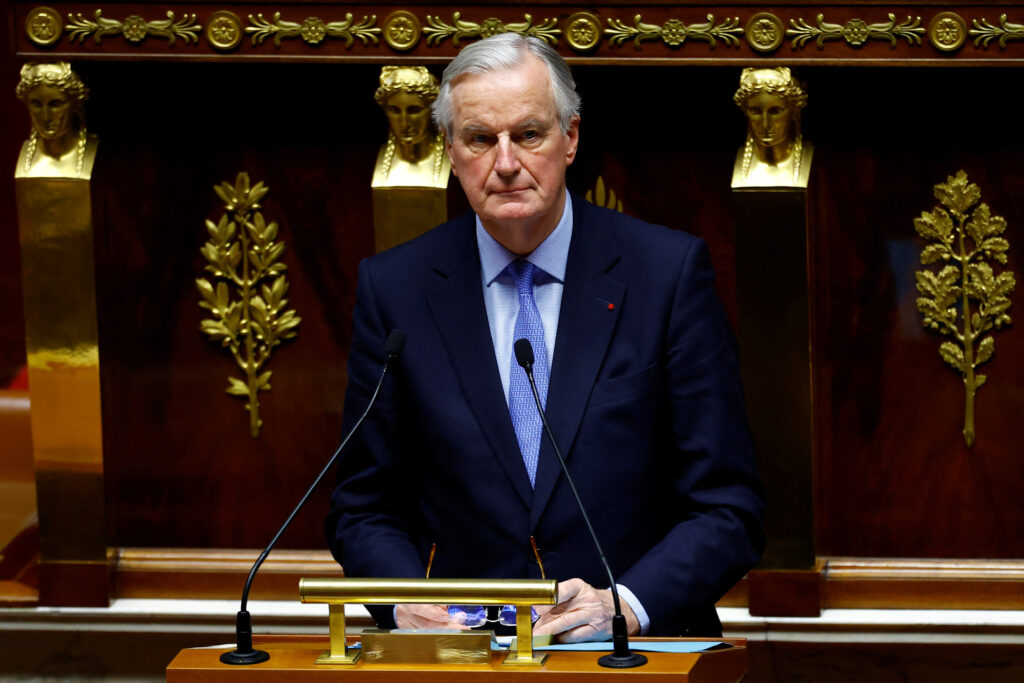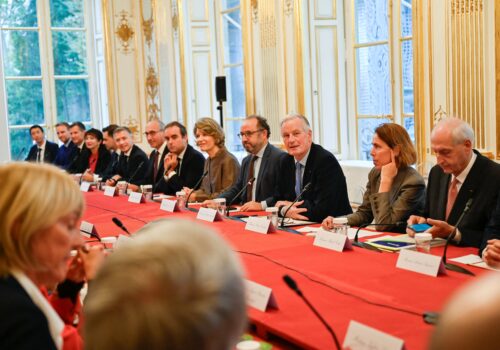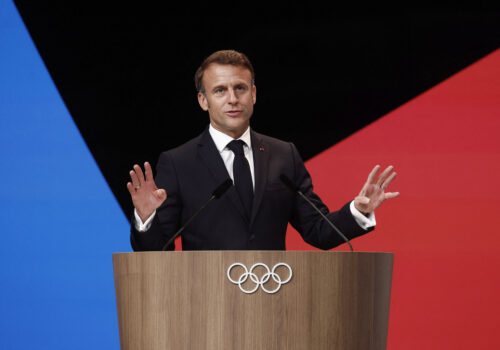The political terms left and right first emerged in France to describe opposing factions that were unsettling national politics. On Wednesday, French lawmakers demonstrated how the two sides could work together to the same effect. In the National Assembly, Marine Le Pen’s far-right National Rally joined a left-wing coalition to pass a no-confidence vote against Prime Minister Michel Barnier, who submitted his resignation on Thursday. Barnier had been in office for just ninety-one days, following legislative and European Parliament elections this summer that see-sawed between support for the right and the left. So what lies ahead? Could French President Emmanuel Macron step down under pressure? And what does this mean for the rest of Europe? Below, Atlantic Council experts share their frank insights.
Click to jump to an expert analysis:
Rama Yade: The French political scene is increasingly pushing for Macron’s resignation
Gérard Araud: This is only the first stage of France’s political crisis
Charles Lichfield: The French Parliament chose chaos over compromise on the budget
Leonie Allard: The collapse comes at a critical moment for transatlantic security
The French political scene is increasingly pushing for Macron’s resignation
The overthrow of the Barnier government is historic. This is only the second time under the Fifth Republic that the French government has been overthrown by a no-confidence vote. This was perfectly predictable as a right-wing government from the weakest party in Parliament could not last without any democratic legitimacy, given that the left had won the legislative elections of July 2024. Secondly, having placed itself from the outset in the hands of the far right, which is unreliable in political negotiations, the Barnier government had lost part of its credibility with the left, which, consequently, never wanted to be associated with it. As for the government team, it had no clear political line, not really being supported by Macron’s party.
All this plunges France into an exceptional crisis as the country faces stark challenges, with a public debt that has increased by more than half in seven years, from 2 trillion to 3.2 trillion euros. Not to mention, France has nine million people living in poverty, an increase in factory closures, and a foreign trade deficit of around one hundred billion euros in 2023—a sign of an accelerated deindustrialization of the French economy.
As a result, a growing number of people in the French political scene do not see how the government can carry on like this until the next presidential election in 2027. To unlock the political crisis, many imagine no other outcome than Macron’s resignation and the organization of an early presidential election.
—Rama Yade is the senior director of the Atlantic Council’s Africa Center and a senior fellow with the Europe Center. She was the first woman of African descent to become a member of the French cabinet, serving as France’s deputy minister of foreign affairs and human rights, deputy minister of sports, and ambassador to the United Nations Educational, Scientific, and Cultural Organization (UNESCO) under French President Nicolas Sarkozy (2007-2012).
This is only the first stage of France’s political crisis
The fall of the Barnier government was predictable. It was a minority government, the survival of which was dependent on the will and the ability of the political parties to negotiate compromises. But the leaders of the two main parties on the far right and on the far left didn’t have any interest in playing this game. Both wanted to go to a crisis in the hope of obliging Macron to resign. On the left, Jean-Luc Mélenchon wants to run before the emergence of competitors, and on the right, Le Pen wants to run before being convicted in an ongoing court case.
It is an unprecedented crisis with an unpredictable outcome. How to govern France with a hung Parliament where a majority agrees only on one issue—the refusal of compromises? With snap elections constitutionally impossible, because France just held one last summer, Macron is now on the front line. The pressure for his resignation is growing. I doubt he will cave in. This is only the first stage of the French political crisis.
—Gérard Araud is a distinguished fellow at the Atlantic Council’s Europe Center and a former ambassador of France to the United States.
The French Parliament chose chaos over compromise on the budget
The French government has fallen amid increasingly desperate attempts to pass a budget that even begins to address the country’s economic challenges. Macron bears some responsibility for how we got here. The last government also lacked a parliamentary majority, albeit by a smaller margin. It was therefore likely to fall if it had stayed on to pass a budget for 2025. But the French president responded to his party’s poor performance in June’s European elections by dissolving Parliament.
Macron still claims he was right to do so. The fragile but effective alliance of the broader left coupled with the heavy campaigning of the centrist parties that support Macron pushed the obvious favorites, Le Pen’s far-right National Rally, into third place. It helped that the latter was very badly prepared. But the Parliament of France is now divided three ways—a slightly larger center block sandwiched between the far left and the far right. So the equation for passing a budget is even more complex than it might have been had the previous Parliament stayed in place.
It is not only Macron’s fault that the parties that didn’t support Barnier’s beleaguered government chose chaos over compromise. This sorry story has also provided a crystal clear illustration of how irresponsible French members of Parliament can be. The tax increases and modest savings put forward by Barnier to plug France’s gaping deficit were never seriously discussed. Instead, both upper and lower houses diluted most savings (especially anything concerning pensioners) and claimed to be compensating for this through scattered and ill-thought tax increases, with little to no consideration for the competitiveness of the French economy.
Parliaments in the rest of Europe have demonstrated a knack for compromise when passing budgets. This is their job. But France has an irresponsible Parliament. Suggesting that Macron’s resignation could solve this mess is shockingly hypocritical.
—Charles Lichfield is the deputy director and C. Boyden Gray senior fellow of the Atlantic Council’s GeoEconomics Center.
The collapse comes at a critical moment for transatlantic security
Despite the political instability of his second term, Macron has aimed to keep the course on France’s most pressing foreign policy issues. The fragility of his minority government has placed him yet again in a dilemma he has tried to avoid: accept the far right’s upper hand or build a coalition with the left bloc. While the government’s stability doesn’t hinge on foreign policy issues, especially in light of the president’s special prerogatives in this domain, the possible necessity to build a coalition could open a debate regarding France’s position on Israel’s wars with Hamas and Hezbollah and, to a lesser extent, on Ukraine. In French domestic politics, the Palestinian cause is often perceived through the lens of the country’s complicated relationship with its Muslim community. While French support for Ukraine remains less tied to domestic affairs, Le Pen’s party has been critical of Macron’s policy toward Russia.
The political vacuum in Paris and Berlin directly affects European leadership and unity. The reshuffle comes at a critical juncture—just as Europe needs to adapt both its support for Ukraine and its security architecture given the new limits on transatlantic relations imposed by the return of a Trump administration.
Despite an unstable domestic context, France has worked to build a common strategic vision for European foreign and defense policy. It has done so by investing in the European Union, as well as by participating in mini-lateral formats such as the Weimar Triangle and the E3, Italy, Poland dialogue. It has also taken steps to strengthen its engagement with Central and Eastern Europe. Now more than ever, France should continue to bolster its support for those countries that enjoy more political initiative at the European level. Macron’s virtual appearance at the November 27-28 Harpsund summit, organized by the Nordic and Baltic states in partnership with Poland, to discuss European security is the kind of step that can keep France heading in the right direction.
—Léonie Allard is a visiting fellow at the Atlantic Council’s Europe Center, previously serving at the French Ministry of Armed Forces.
French political turmoil reinforces Warsaw’s approach of looking beyond Paris and Berlin
Despite long-standing political polarization in Poland, there is a broad consensus that new leadership for Europe is needed. The collapse of the government in France, recently preceded by similar events in Germany, will only reinforce this view.
Following US President-elect Donald Trump’s victory, Polish Prime Minister Donald Tusk has publicly warned of serious challenges for Europe and signaled that he takes Trump’s campaign announcements about Ukraine very seriously. The Polish government, Tusk announced, wants to urgently coordinate with countries with a similar outlook to jointly address Europe’s geopolitical challenges.
Being a staunch pro-European at heart, Tusk initially banked on the Weimar Triangle, but cooperation among Poland, France, and Germany has been disappointing. Poland has had difficulty breaking through the Paris-Berlin consensus. For a long time, Poland accepted its status as the junior partner. But now that Poland is the most politically stable member of the three, those days are gone. Who could have imagined that when the initiative was first created in 1991?
The recent developments in France will likely reinforce Tusk’s conviction that Poland was right to sign a strategic partnership agreement with Sweden at the recent Nordic-Baltic summit in late November. These countries, along with Romania and the Czech Republic, were identified as Poland’s “valuable and forward-looking allies” in Foreign Minister Radosław Sikorski’s recent statement to the Polish parliament.
The collapse of the French government will also strengthen Tusk’s belief that Polish-British relations are important for Polish security. Warsaw will likely take advantage of the fact that London is interested for similar reasons.
We should expect Warsaw to lean into these relationships as Poland takes over the presidency of the Council of the European Union, which will have a heavy focus on European security. For Poland, Paris and Berlin no longer loom as large as they once did.
—Aaron Korewa is the director of the Atlantic Council’s Warsaw Office, which is part of the Europe Center.
Further reading
Thu, Sep 26, 2024
France’s new government aims to calm the political storm. What will it mean for foreign policy?
New Atlanticist By Léonie Allard, Jean-Loup Samaan
Prime Minister Michel Barnier is likely to follow the path of President Emmanuel Macron, but the big question is whether the delicate political context in Paris will allow ministers to focus on crises in Ukraine and Lebanon.
Wed, Aug 14, 2024
The Olympic truce in French politics is ending. What happens next?
New Atlanticist By
Macron is basking in the success of a spectacular Olympics, but that success is unlikely to translate into political gains for the president or lead to compromises in the French Parliament.
Fri, Jul 26, 2024
What French economic policy may look like after the Olympics
Econographics By
The snap parliamentary election in France produced no absolute majority, and negotiations on government formation have begun. As Macron’s centrists attempt to construct a broad coalition, what economic policies can they suggest to bring the center-left and center-right onside?
Image: French Prime Minister Michel Barnier arrives to deliver a speech during a debate on two motions of no-confidence against the French government, tabled by the alliance of left-wing parties the "Nouveau Front Populaire" (New Popular Front - NFP) and the far-right Rassemblement National party, after the use by French government of the article 49.3, a special clause in the French Constitution, to push the budget bill through the National Assembly without a vote by lawmakers, at the National Assembly in Paris, France, December 4, 2024. REUTERS/Sarah Meyssonnier.



